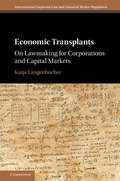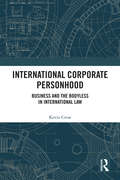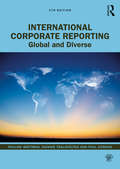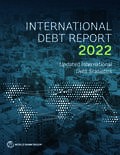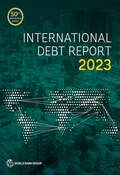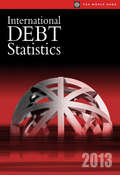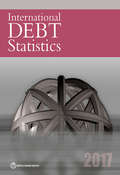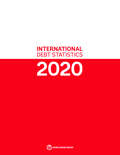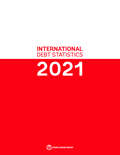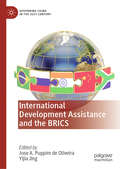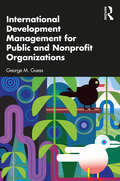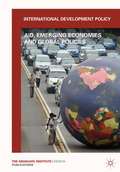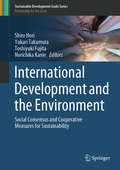- Table View
- List View
International Corporate Law and Financial Market Regulation: On Lawmaking for Corporations and Capital Markets (International Corporate Law and Financial Market Regulation)
by Katja LangenbucherWhy and in what ways have lawyers been importing economic theories into a legal environment, and how has this shaped scholarly research, judicial and legislative work? Since the financial crisis, corporate or capital markets law has been the focus of attention by academia and media. Formal modelling has been used to describe how capital markets work and, later, been criticised for its abstract assumptions. Empirical legal studies and regulatory impact assessments offered different ways forward. This book presents a new approach to the risks and benefits of interdisciplinary policy work. The benefits economic theory brings for reliable and tested lawmaking are contrasted with important challenges including the significant differences of research methodology, leading to misunderstandings and problems of efficient implementation of economic theory's findings into the legal world. Katja Langenbucher's innovative research scrutinises the potential of economic theory to European legislators faced with a lack of democratic accountability.
International Corporate Personhood: Business and the Bodyless in International Law
by Kevin CrowThis book tracks the phenomenon of international corporate personhood (ICP) in international law and explores many legal issues raised in its wake. It sketches a theory of the ICP and encourages engagement with its amorphous legal nature through reimagination of international law beyond the State, in service to humanity. The book offers two primary contributions, one descriptive and one normative. The descriptive section of the book sketches a history of the emergence of the ICP and discusses existing analogical approaches to theorizing the corporation in international law. It then turns to an analysis of the primary judicial decisions and international legal instruments that animate internationally a concept that began in U.S. domestic law. The descriptive section concludes with a list of twenty-two judge-made and text-made rights and privileges presently available to the ICP that are not available to other international legal personalities; these are later categorized into ‘active’ and ‘passive’ rights. The normative section of the book begins the shift from what is to what ought to be by sketching a theory of the ICP that – unlike existing attempts to place the corporation in international legal theory – does not rely on analogical reasoning. Rather, it adopts the Jessupian emphasis on ‘human problems’ and encourages pragmatic, solution-oriented legal analysis and interpretation, especially in arbitral tribunals and international courts where legal reasoning is frequently borrowed from domestic law and international treaty regimes. It suggests that ICPs should have ‘passive’ or procedural rights that cater to problems that can be characterized as ‘universal’ but that international law should avoid universalizing ‘active’ or substantive rights which ICPs can shape through agency. The book concludes by identifying new trajectories in law relevant to the future and evolution of the ICP. This book will be most useful to students and practitioners of international law but provides riveting material for anyone interested in understanding the phenomenon of international corporate personhood or the international law surrounding corporations more generally.
International Corporate Reporting: Global and Diverse
by Pauline Weetman Paul Gordon Ioannis TsalavoutasThis textbook provides a comprehensive overview of international corporate reporting which enhances students’ understanding of diversity and convergence in the field. The authors discuss the institutional and cultural context in which international corporate reporting has developed over the years as well as the global reach of IFRS Standards from the IASB throughout and beyond the European Union, into interest groups and emerging economies. Other key elements explored throughout the book include assurance through auditing and corporate governance, narrative reporting, strategic and corporate social responsibility, group accounting, current accounting issues and taxation in corporate reports. Indicative research examples show how the methods used in research papers may be understood and applied. Case studies outline short projects based on corporate cases, with related links to material on corporate websites. Helpful and reliable sources of information and data are identified through hyperlinks to accessible websites. End-of-chapter questions encourage discussion of the main issues. Throughout there is a focus on accountability and the information needs of stakeholders. This new edition of a classic text is fully revised and updated in order to remain essential reading for students of international accounting and corporate reporting globally. The book will be an invaluable resource for postgraduate taught programmes and final-year undergraduate courses in accounting, finance and business studies.
International Crime in the 20th Century
by Paul KnepperBetween 1919 and 1939, crime received a prominent place on the international public agenda. This book explores the blueprint for twenty-first century international crime prevention - The League of Nations approach - which established institutions for confronting dangerous drugs, traffic in women and terrorist violence.
International Crisis Management: The Approach of European States (Routledge Studies in Governance and Change in the Global Era)
by Marc HoubenOver the past fifty years, crisis management has become essential to achieving and maintaining national security. This book offers a comparative analysis of the preconditions and constraints nine European states place on their participation in international crisis management operations and the important consequences of such decisions, and provides a theoretical framework to help the reader understand this complex decision-making process.
International Cultural Tourism
by David Leslie Marianna SigalaInternational Cultural Tourism: management, implications and cases provides a comprehensive exploration of the management, operations and marketing of cultural tourism attractions and resources in a global context. Topics explored include: * For the first time, an evaluation of the use and transformational impact of global media and new ICT in the management and marketing of cultural tourism attractions and resources. * The changing nature of the global cultural tourism marketplace (including demand, supply, product development and political changes). * Consumer behaviour, profiles and motivations of cultural tourists.* Environmental performance, management and wider issues of social and cultural sustainability.Written by a team of contributors from Australia, Hong Kong, UK, US, Canada, Mexico, Portugal, South Africa and Finland, this text provides a thoroughly global insight into the issues and techniques involved in the successful management and marketing of cultural attractions.* An overview of the way in which cultural tourism resources and attractions are managed and marketed in a global context. * Analysis of the demand, profiles and motivation of tourists * An investigation of the transformational and dynamic impacts of new technologies on cultural resources and products * International contributor team provide case studies from first-hand experience and research
International Currency Exposure (CESifo Seminar Series)
by Yin-Wong Cheung Frank WestermannIssues in debates about foreign currency exposure—the denomination of liabilities or assets in foreign currency. The foreign currency denomination of contracts in international transactions can lead to international currency exposure at the country level with important economic and policy implications. When debts are denominated in foreign currency and revenues in domestic currency, exchange rate fluctuations can result in balance sheet effects for countries with either net asset or liability positions. Moreover, currency mismatch between assets and liabilities can be a cause for crises in developing and emerging economies. This book looks at the issues surrounding foreign currency exposure in today's increasingly integrated world economy.The contributors draw on cross-country as well as country-specific data. They consider international currency risk after the Swiss franc ended its one-sided peg with the euro, for example, and the foreign exchange positions of firms in Turkey and Russia. Other contributors take macroeconomic perspectives, examining the potential effects of exchange rate realignment, the pressure to appreciate on countries with current account surpluses, and the currency exposure in international trade. Finally, contributors consider the issue from finance and political economy perspectives, addressing the phenomenon of the forward premium puzzle and discussing geopolitical aspects ascending currencies. Contributors Fatih Altunok, Huseyin Aytug, Agustín S. Bénétrix, Jörg Breitung, Paul De Grauwe, Eiji Fujii, Peter Garber, Juann H. Hung, Signe Krogstrup, Philip R. Lane, Katja Mann, Arif Oduncu, Gunther Schnabl, Maria V. Sokolova, Cédric Tille
International Debt
by Otto Hieronymi Constantine A. StephanouWritten by a group of international experts, this book focuses on three interdependent themes: (a) origins and consequences of the current debt crisis; (b) the systemic nature of the crisis; (c) national and international policy efforts to avoid a global collapse and bring about lasting reforms in the Euro zone and in the financial system.
International Debt Report 2022: Updated International Debt Statistics (International Debt Report)
by World BankThe 'International Debt Report' (IDR), formerly 'International Debt Statistics' (IDS), is a longstanding annual publication of the World Bank featuring external debt statistics and analysis for the 121 low- and middle-income countries that report to the World Bank Debtor Reporting System. IDR 2022 includes (1) analyses of external debt stocks and flows from 2010 to 2021 for these countries; (2) an assessment of the evolution of the creditor composition of external debt over the past decade with particular emphasis on the emergence of nontraditional bilateral creditors and private creditors and how this has impacted the structure of borrowers' public debt portfolios and debt servicing costs, which complicates the debt restructuring process; (3) a focus on how the World Bank has sought to enhance data quality and transparency against the backdrop of rapidly changing global debt dynamics (including an increase in commercial borrowing, nontraditional lenders, and new instruments) that contribute to debt transparency issues; (4) tables and charts detailing debtor and creditor composition of debt stock and flows, terms volume, and terms of new commitments, maturity structure of future debt service payments and debt burdens, measured in relation to gross national income and export earnings for each country; and (5) a one-page summary for each country, plus global, regional, and income-group aggregates showing debt stocks and flows, relevant debt indicators, and metadata for 6 years (2010 and 2017†“2021). Unique in its coverage of the important trends and issues fundamental to the financing of low- and middle-income countries, 'International Debt Report 2022' is an indispensable resource for governments, economists, investors, financial consultants, academics, bankers, and the entire development community. For more information on IDR 2022 and related products, please visit the World Bank's Debt Statistics website at www.worldbank.org/debtstatistics.
International Debt Report 2023 (International Debt Report)
by World BankThe International Debt Report (IDR) is a longstanding annual publication of the World Bank featuring external debt statistics and analysis for the 122 countries that report to the World Bank Debtor Reporting System. IDR 2023 is the 50th annual edition and includes (1) analyses of external debt stocks and flows as of end-2022 for these countries; (2) the macroeconomic and debt outlook for 2023 and beyond; (3) a focus on improved public debt transparency and the quality of debt reporting; (4) a discussion of the need for innovative approaches to debt management; (5) a commentary on how the International Debt Statistics database serves as an indispensable resource for researchers and policy makers; and (6) a one-page snapshot of relevant debt indicators and summary of debt stocks and flows for six years (2010 and 2018†“22) for each country, plus global income group and regional aggregates. Unique in its coverage of the important trends and issues fundamental to the financing of low- and middle-income countries, IDR 2023 is an indispensable resource for governments, economists, investors, financial consultants, academics, bankers, and the entire development community. For more information on IDR 2023 and related products, please visit the World Bank’s Debt Statistics website at www.worldbank.org/debtstatistics.
International Debt Statistics 2013: External Debt of Developing Countries
by World BankInternational Debt Statistics (IDS) 2013 is a continuation of the World Bank's publications Global Development Finance, Volume II (1997 through 2009) and the earlier World Debt Tables (1973 through 1996). IDS 2013 provides statistical tables showing the external debt of 128 developing countries that report public and publicly guaranteed external debt to the World Bank's Debtor Reporting System (DRS). It also includes tables of key debt ratios for individual reporting countries and the composition of external debt stocks and flows for individual reporting countries and regional and income groups along with some graphical presentations. IDS 2013 draws on a database maintained by the World Bank External Debt (WBXD) system. Longer time series and more detailed data are available from the World Bank open databases, which contain more than 200 time series indicators, covering the years 1970 to 2011 for most reporting countries, and pipeline data for scheduled debt service payments on existing commitments to 2019. International Debt Statistics 2013 is unique in its coverage of the important trends and issues fundamental to the financing of the developing world. This report is an indispensible resource for governments, economists, investors, financial consultants, academics, bankers, and the entire development community. In addition, International Debt Statistics will showcase the broader spectrum of debt data collected and compiled by the World Bank. These include the high frequency, quarterly external debt database (QEDS) and the quarterly public sector database (QPSD) developed in partnership with the International Monetary Fund and launched by the World Bank.
International Debt Statistics 2014
by World BankInternational Debt Statistics (IDS) 2014 is a continuation of the World Bank's publications Global Development Finance, Volume II (1997 through 2009) and the earlier World Debt Tables (1973 through 1996). IDS 2014 provides statistical tables showing the external debt of 128 developing countries that report public and publicly guaranteed external debt to the World Bank's Debtor Reporting System (DRS). It also includes tables of key debt ratios for individual reporting countries and the composition of external debt stocks and flows for individual reporting countries and regional and income groups along with some graphical presentations. IDS 2014 draws on a database maintained by the World Bank External Debt (WBXD) system. Longer time series and more detailed data are available from the World Bank open databases, which contain more than 200 time series indicators, covering the years 1970 to 2012 for most reporting countries, and pipeline data for scheduled debt service payments on existing commitments to 2019. International Debt Statistics 2014 is unique in its coverage of the important trends and issues fundamental to the financing of the developing world. This report is an indispensable resource for governments, economists, investors, financial consultants, academics, bankers, and the entire development community. In addition, International Debt Statistics will showcase the broader spectrum of debt data collected and compiled by the World Bank. These include the high frequency, quarterly external debt database (QEDS) and the quarterly public sector database (QPSD) developed in partnership with the International Monetary Fund and launched by the World Bank.
International Debt Statistics 2020 (International Debt Statistics)
by World BankInternational Debt Statistics {IDS) is a longstanding annual publication of the World Bank featuring external debt statistics and analysis for the 123 low- and middle-income countries that report to the World Bank Debt Reporting System (DRS). The content coverage of IDS 2020 includes:.1) a user guide describing the IDS tables and content, definitions and rationale for country and income groupings, data notes, and description of the additional resources and comprehensive datasets available to users online, 2) a brief overview analyzing global trends in debt stocks and debt flows to low- and middleincome countries within the framework of aggregate capital flows (debt and equity), 3) a feature story on lending by the World Bank in recognition of the institution's 75th anniversary, 4) tables and charts detailing debtor and creditor composition of debt stock and flows, terms volume and terms of new commitments, maturity structure of future debt service payments and debt burdens, measured in relation to GNI and export earnings for each country, and 5) one-page summaries per country, plus global, regional and income-group aggregates showing debt stocks and flows, relevant debt indicators and m_etadata for 5 years (2014-2018).
International Debt Statistics 2021 (International Debt Statistics)
by World BankInternational Debt Statistics (IDS), a long-standing annual publication of the World Bank, features external debt statistics and analysis for the 120 low- and middle-income countries that report to the World Bank Debtor Reporting System. IDS 2021 includes (1) an overview analyzing global trends in debt stocks of and debt flows to low- and middle-income countries within the framework of aggregate capital flows (debt and equity); (2) a feature story on the World Bank and International Monetary Fund Debt Service Suspension Initiative in response to the COVID-19 pandemic; (3) tables and charts detailing debtor and creditor composition of debt stock and flows, terms of new commitments, and maturity structure of future debt service payments and debt burdens, measured in relation to gross national income and export earnings for each country; (4) one-page summaries per country, plus global, regional, and income group aggregates showing debt stocks and flows, relevant debt indicators, and metadata for six years (2009 and 2015†“19); and (5) a user guide describing the tables and content, definitions and rationale for the country and income groupings used in the report, data notes, and information about additional resources and comprehensive data sets available to users online. Unique in its coverage of the important trends and issues fundamental to the financing of low- and middle-income countries, IDS 2021 is an indispensable resource for governments, economists, investors, financial consultants, academics, bankers, and the entire development community. For more information on IDS 2021 and related products, please visit the World Bank’s Data Catalog at https://datacatalog.worldbank.org/dataset/international-debt-statistics.
International Debt Statistics 2022 (International Debt Statistics)
by World BankInternational Debt Statistics (IDS), a long-standing annual publication of the World Bank, features external debt statistics and analysis for the 123 low- and middle-income countries that report to the World Bank Debtor Reporting System. This 2022 edition of IDS includes (1) an overview analyzing global trends in debt stocks of and debt flows to low- and middle-income countries within the framework of aggregate capital flows (debt and equity); (2) an evaluation of the volume of debt service deferred through the Debt Service Suspension Initiative (DSSI) in 2020 and the 2021 extension for participating eligible countries, as well as borrowing trends and debt service costs for DSSI-eligible countries that did not participate in the initiative; (3) tables and charts detailing debtor and creditor composition of debt stock and flows, terms of new commitments, and maturity structure of future debt service payments and debt burdens, measured in relation to gross national income and export earnings for each country; (4) one-page summaries per country, plus global, regional, and income group aggregates showing debt stocks and flows, relevant debt indicators, and metadata for six years (2010 and 2016†“20); and (5) a user guide describing the tables and content, definitions and rationale for the country and income groupings used in the report, data notes, and information about additional resources and comprehensive datasets available to users online. Unique in its coverage of the important trends and issues fundamental to the financing of low- and middle-income countries, IDS 2022 is an indispensable resource for governments, economists, investors, financial consultants, academics, bankers, and the entire development community. For more information on IDS 2022 and related products, please visit the World Bank's Data Catalog at https://datacatalog.worldbank.org/dataset/international-debt-statistics.
International Development Assistance and the BRICS (Governing China in the 21st Century)
by Yijia Jing Jose A. Puppim de OliveiraThis book aims to bring together a series of analyses on international development assistance in the BRICS, the group of countries that includes Brazil, Russia, India, China and South Africa. The BRICS states comprise approximately 3 billion people (~40% of the World’s population) and in terms of GDP account for 16.8 trillion dollars (~22% of the World’s economy). Over the last decade the loose coalition has evolved to become a formal partnership on both economic and political fronts. The first formal meeting of the then-four BRIC countries took place in 2006 during the United Nations General Assembly. This was followed in 2009 by the first summit of BRICS' heads of state, an event which has been convened annually ever since. On 3-5 September 2017, the ninth BRICS Summit was hosted in Xiamen, China. This book, an anthology of scholars based in BRICS countries, provides invaluable insights into the emerging global south coalition, and will be of interest to scholars, employees of NGOs, and China watchers.
International Development Assistance: Policy Drivers and Performance (EADI Global Development Series)
by Olav StokkeThis book provides a comprehensive search for the basic political drivers of international development cooperation, based on the policy and performance of the OECD countries from the early 1960s to the present. The author focuses on the stated and implemented policies of the four so-called frontrunners and the Western hegemon, scrutinizing the changing trends in the justifications, objectives and guidelines set for the policy and their evolving performance vis-à-vis the international ODA target. Through extensive research, the work examines predominant world-views, societal value systems and foreign policy traditions, in order to find the policy drivers that vary nation to nation and how development assistance has evolved globally.
International Development Cooperation of Japan and South Korea: New Strategies for an Uncertain World
by Huck-Ju Kwon Tatsufumi Yamagata Eunju Kim Hisahiro KondohThis book examines the evolution of foreign aid policy in Japan and South Korea, analyzing policy rationales, institutional developments and policy choices. The book searches for new strategies of international development cooperation in an uncertain world. The book compares two countries’ policies in a unique way: pairs of Japanese and Korean scholars examine same policy themes in separate chapters, contrasting differences and similarities. This book will be of great value to scholars of international development cooperation, public policy and East Asian politics.
International Development Law: Rule of Law, Human Rights & Global Finance (International Economic Development Law Ser. #Vol. 14)
by Rumu SarkarThis book describes how international development works, its shortcomings, its theoretical and practical foundations, along with prescriptions for the future. International Development Law provides the reader with new perspectives on the origins of global poverty, identifies legal impediments to sustainable economic growth, and provides a better understanding of the challenges faced by the international community in resolving global poverty issues. The text is structured into two basic parts: the first part deals with the theoretical and philosophic foundations of the subject, and the second part sets forth issues relating to the international financial architecture, namely, international borrowing practices, privatization, and emerging economies. In particular, the book provides new, innovative analysis on corruption as an impediment to sustainable development. The three interlocking facets of corruption are examined: transnational organized crime, Islamic-based international terrorism, and corruption within emerging economies and the international banking system. Thus fresh new analysis adds depth and clarity to a field that heretofore has been scattered and superficial. Finally, the “right to development” within the international human rights discourse is critically reviewed, particularly in light of new jurisprudence emerging from the African context.This book offers a fresh, new and balanced legal perspective on the development process. The text has been rigorously researched and has many practical facets based on the author’s professional experience within the international development field. It is an invaluable research and teaching tool since it takes a multidisciplinary approach to putting complex issues, legal trends and political questions into a clear, new perspective that is highly analytical as well as accessible to the reader. The author's elegant legal prose is both powerful and persuasive.
International Development Management for Public and Nonprofit Organizations
by George M. GuessManaging international development and aid programs often relies on trial and error and flexibility. Practitioners need a mix of management theory and field practice to prepare them for work in other countries—transitional, developing, wealthier, and poorer alike. Filling an important gap in the literature for graduate students and practitioners in the public sector, private firms, contractors, and nonprofit organizations that manage development assistance projects, this is a guide to dealing with core issues likely to be faced in doing field work.International Development Management for Public and Nonprofit Organizations offers an accessible primer on the basics of managing and motivating people, teams, and organizations. It focuses on challenges and opportunities to managing in difficult cultures and contexts, including hostile political regimes. The book takes a deeper look at management in four sectors: public finance, urban transport, K–12 education, and natural resources and the environment. Presented throughout the book are 28 cases, designed to stimulate critical discussions, as well as five technical exercises to allow integration of theory and practice. This textbook is supplemented by slides for teaching along with a sample syllabus. It is addressed to current and future international aid managers, including those enrolled in international management and international development courses at the university level. Professional development organizations, such as contractors, nonprofits, and donors, will also find the book a useful addition to their training materials.
International Development Policy: Aid, Emerging Economies and Global Policies
by Gilles CarbonnierInternational development cooperation is undergoing a revolution. The authors question how far bilateral and multilateral aid agencies succeed in mainstreaming global issues in their operations and assess how emerging and traditional donors address competing objectives, often with diverging rationales. Cases include Brazil, China and South Africa.
International Development Policy: Religion and Development
by Et. Al. Gilles CarbonnierWith the resurgence of religion and rise of fundamentalism within major religions, academics and development agencies are increasingly debating the appropriate role of religion and faith-based organisations in development policy and practice. A global cast of scholars and practitioners examine these issues and fundamentally question the secular-religious dichotomy in development discourse and practice. They shed light on the reluctance of mainstream economic development approaches to incorporate religion into policy and practice. They examine recent initiatives by international development agencies and donors to integrate religion into development policy, and to develop partnerships with faith-based organizations. Through research on religious movements in Brazil, South Africa, Sri Lanka, China, Turkey and the states of the 'Arab-Spring', the authors discuss whether faith and religion provide a credible alternative to the (neo)liberal democratic development agenda.
International Development Studies: Theories and Methods in Research and Practice
by Dr Michael A Tribe Dr Andrew Sumner'A sure-footed and self-confident book, ambitious in scope, authoritative in execution and practical in its implications' - Simon Maxwell, Director, Overseas Development Institute, London 'At last, a development studies text that encourages self-reflection from within the discipline. Highly recommended' - Professor Ray Kiely, Chair in International Politics, Queen Mary University of London 'This is the book that academics, development researchers and practitioners have been seeking for a long time. [It] addresses the most important issues which development researchers and practitioners cope with each and every day' - Dr Tran Tuan, Director, Research and Training Centre for Community Development, Hanoi, Vietnam. 'An insightful book for both development practitioners and researchers alike' - Professor K.N. Nair, Director Centre for Development Studies, Kerala, India This book is about working professionally in Development Studies as a student, researcher or practitioner. It introduces and addresses the fundamental questions that everyone engaged with development must ask: " What is 'development' and why do we wish to study it? " How do the many theoretical, methodological and espistemological approaches relate to research and practical studies in development? " How are development research and practice linked? Accessibly written, with extensive use of case study material, this book is an essential primer for students of development studies who require a concise, penetrating overview of its foundations. It is also core reading for students and practitioners concerned with the design of studies in the course of policy analysis, sector reviews, or project formulation, management and evaluation.
International Development and the Environment: Social Consensus and Cooperative Measures for Sustainability (Sustainable Development Goals Series)
by Toshiyuki Fujita Shiro Hori Yukari Takamura Norichika KanieThis book analyzes the interplay between development and the environment, focusing on how to forge social consensus and practices in the international community. Since the Rio Earth Summit in 1992, sustainable development has increasingly attracted the attention of the international community, and several international agreements have been concluded to combat issues such as climate change. The Sustainable Development Goals (SDGs) were introduced as common objectives, and the Paris Agreement was adopted as a subsequent outcome. In light of today’s globalized world, how to best achieve sustainable development—and prioritize climate change in particular—is an issue involving various perspectives on the environment and economic development in the global community.The book provides students, businesspeople and government officials with a concept of sustainable development that is based on using social consensus, social norms, and practices (cooperative global actions) to achieve common goals. It is divided into three parts, the first of which focuses on the goals and development needed to achieve sustainable development. The second part explores measures to promote sustainable development, while the third highlights current climate change issues and aspects related to the effective implementation of international frameworks.
